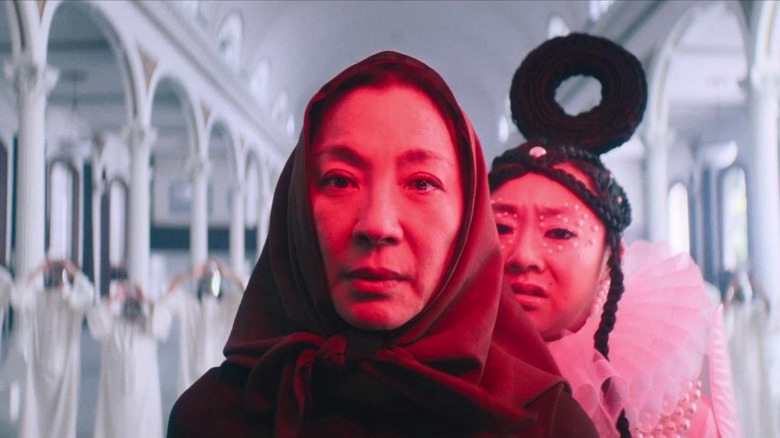
(Welcome to Did They Get It Right?, a series where we take a look at an Oscars category from yesteryear and examine whether the Academy's winner stands the test of time.)
Going into the 95th Academy Awards, everyone expected a big night for "Everything Everywhere All at Once," the breakout sensation of 2022, and that is exactly what we got. The film took home an impressive seven awards out of its 11 nominations, including Best Picture, Best Director, Best Original Screenplay, and Best Supporting Actor. Beyond that, though, it even managed to score wins in Best Actress and Best Supporting Actress, which was not a foregone conclusion. It also did well below the line, picking up a prize for Best Editing. It's the most awards a Best Picture winner has won going all the way back to "Slumdog Millionaire."
While fans of the film are no doubt rejoicing in the little-film-that-could's success, its dominance meant there was not much room for other films to really shine. Some may see that as a positive, considering the general lack of Asian and Asian-American representation in the history of the Oscars, but artistically, the year presented many worthy winners in these nominations. Because "Everything Everywhere" was such a colossal force, these other works won't have the added benefit of a gold star next to their names indicating to people 10, 20, 50 years in the future that these are films that deserve their attention. Let's look at some of the categories that propelled "Everything Everywhere All at Once" to its massive trophy haul and see where history could have pivoted.
The Perils Of Overwhelming Awards Success
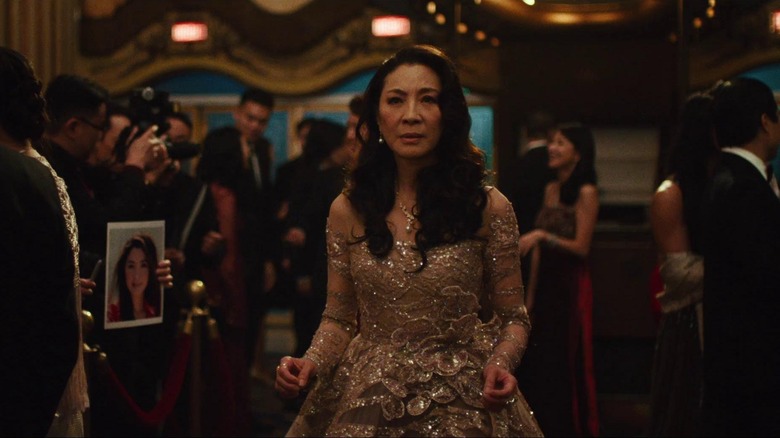
Winning Best Picture is always a double-edged sword. On the one hand, everyone involved in the film is obviously thrilled the industry at-large recognized their work. On the other, you are now a movie burdened with expectation. I'm not saying this is fair, but winning that award puts so many more eyeballs on your movie that otherwise may have missed it. This past year, "Everything Everywhere All at Once" was an underdog at every turn. This was a movie that premiered at the SXSW Film Festival and released theatrically at the end of March, giving it the space to become a genuine word of mouth hit. It's also a movie that bucks so many of the conventions of the Oscars by being a science fiction film, having a very silly tone for much of its running time, and primarily starring Asian or Asian-American actors. "Everything Everywhere" making it to the finish line like this is completely unique.
But now it's a Best Picture winner. Not only that, it's an Oscar dominator. Its status as the underdog is no more. This film has been accepted at every single level. People will now no longer be coming to this movie with the thought, "I heard this movie's pretty good and weird." That will be replaced with, "Okay, Best Picture. Let's see what you've got," followed by a folding of the arms. Again, I'm not saying that's fair, but that's what's going to happen. And the backlash will occur, unquestionably. Every big winner has dealt with this, from "Titanic" to "Slumdog Millionaire" to "Gigi." The more you win, the more you have to prove yourself. I hope the reputation of "Everything Everywhere" won't be defined by this in the future, but I don't see how it won't be.
The Best Actress Toss-Up

For the vast majority of this awards season, the presumed frontrunner for the Best Actress prize was not Michelle Yeoh. It was Cate Blanchett, who would have taken home her third Oscar had she won for "TÁR." The Golden Globes, Critics' Choice Awards, BAFTAs, Venice Film Festival, and every major critics group all awarded Blanchett. She was steamrolling, but then the SAG Awards came along, and Yeoh won. Same with the Independent Spirit Awards. She surged late and rode the wave of love for "Everything Everywhere All at Once."
Obviously, Yeoh winning is a massive deal. She's the first Asian actor to win the award and only the second woman of color to do so. Taking into account the historical significance of that win, I don't begrudge her taking home the trophy in the slightest. That being said, I do believe that looking back at this year decades from now — when the notion of women of color winning this award is not the rarity it is today — we will all be befuddled at how Cate Blanchett wasn't rewarded for her work in "TÁR." For my money, this is not just the performance of the year but arguably the performance of the past decade, and when we look back at her career as a whole, it's going to feel off that this isn't one of her Oscar wins and somewhat lesser works did earn her the gold. I happen to think "TÁR" getting completely shut out will also look confusing, as I believe time will only grow that film's stature exponentially.
This category was tough. I don't envy the voters in the slightest. Either choice had its pros and cons. I'd vote the other way, but I would never take away Yeoh's triumph.
The One Major Head Scratcher
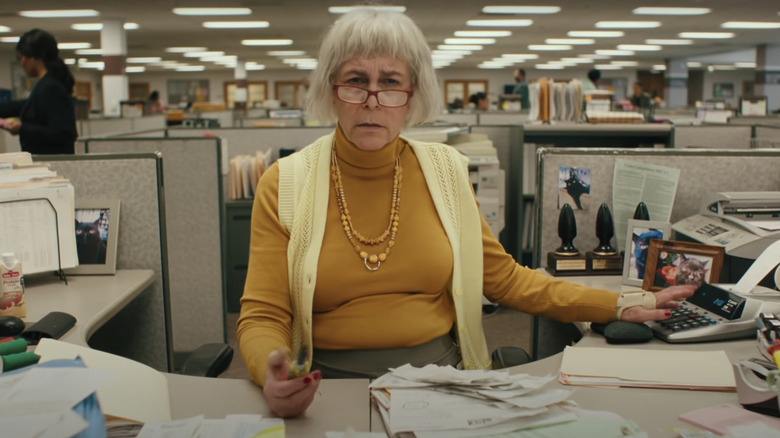
Admittedly, I'm not as enamored with "Everything Everywhere All at Once" as most people. That doesn't mean I can't see why people connect to it, particularly in the form of the runaway winner for Best Supporting Actor in Ke Huy Quan. I very quickly accepted its awards season takeover and am happy that its fans got to enjoy it. However, there was one element of the film that was awarded that I simply cannot understand, and that is Jamie Lee Curtis winning Best Supporting Actress.
I think Curtis is a fantastic actor — don't get me wrong — but when I saw that this performance was getting awards traction, all I could do was quizzically cock my head to the side. I found this to be a rather caricature look at an office woman like this, in the vein of Roz from "Monsters Inc." In a movie that wants to emotionally grip you, I found nothing about this character pulling me in that direction. It makes even less sense as a winner to me when she's competing against her co-star Stephanie Hsu, who is flexing all of those muscles as well as the comedy.
In my "Did They Get It Right?" pieces, I've often spoken about how I'm not a big fan of legacy Oscars, awarding a career rather than the performance, and the only way Curtis winning makes sense is in that narrative. I've written about why I think this would have been a fantastic place to award Kerry Condon for "The Banshees of Inisherin," but that didn't happen.
If One Sweeps, Many Are Left With Nothing
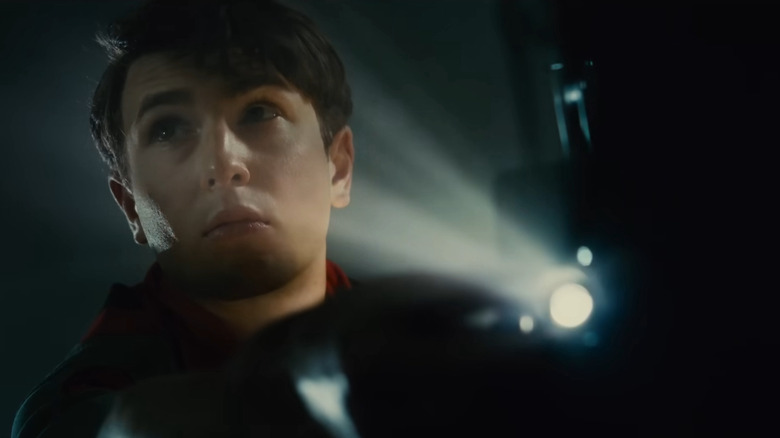
Last year, the film with the most nominations that didn't win a single award was "Don't Look Up," which had four nominations. This year, there were four films that had at least six nominations that went home empty handed: "The Banshees of Inisherin," "Elvis," "The Fabelmans," and "TÁR." Out of those four, "Banshees" had the most with nine nominations. These aren't even every movie this year with multiple nominations that got blanked.
That list of shutouts is unusually long and features a number of movies I believe we will look back on and go, "How did that not win ANYTHING?" If you head over to social media right this very second, you will even see the first reactions of this sort, and we aren't even 24 hours removed from the ceremony. On a personal note, "The Fabelmans" not winning anything is my biggest heartbreaker, as it was my favorite film of the year. Steven Spielberg hasn't won Best Director since "Saving Private Ryan" or Best Picture since "Schindler's List" (his only film to do so), and I don't know what this man has to do to be properly recognized for his totemic body of work.
While that's my personal pick, I firmly believe "TÁR" being passed over will be the one that will leave everyone befuddled in the future. Beyond Cate Blanchett, that is the kind of monumental, mysterious, and masterfully made movie that becomes part of the cinematic firmament, a la "There Will Be Blood," and unless you remember the context of the show, the zero next to the title won't make any sense. Sweeps are fun historically, but they require beloved films to walk away with nothing. This year featured a great number of them.
Two Other Oscar Successes This Year

Only two other movies this year walked away with more than one Academy Award. "All Quiet on the Western Front," the movie many believed had the best shot of beating "Everything Everywhere All at Once" for Best Picture, took home four prizes, which included Best Cinematography, Production Design, Score, and International Feature. Notably, the only category they won in which they directly competed against "Everything Everywhere" was Best Original Score. In a year of a juggernaut, it certainly helps to not be up against it for certain awards. Though it is a German production, "All Quiet" became the representative of the older, classical Academy who love to award a harrowing war film, which makes it one of the more uninspired choices to pick up some awards no matter how you feel about the movie.
The only other multiple winner tonight was ... "The Whale." Again, both categories it won — Best Actor and Best Makeup and Hairstyling — didn't have "Everything Everywhere" as competition. Look, we are all happy about the Brendan Fraser comeback, and I hope he goes on to have an amazing second wind of a career filled with exciting roles. But "The Whale" winning anything really doesn't reflect well upon the Academy. That film has rightfully come under fire for its grotesque and gawking portrayal of a fat person while not even bothering to cast an actual fat person in the role, and awarding the person who shouldn't be playing the part and the fat suit he shouldn't be wearing just feels wrong.
So, when the Academy had the chance to veer from "Everything Everywhere," their choices ended up not being the greatest. Except for "Naatu Naatu" winning Best Original Song. No one will ever be mad at that.
Time For History To Take Shape
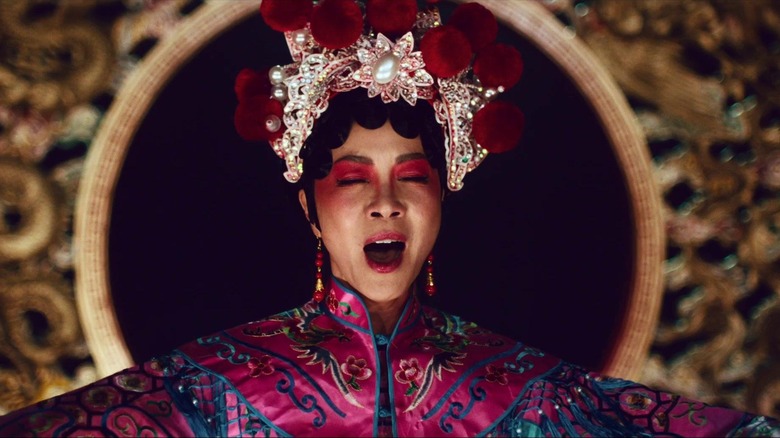
The winner of Best Picture 10 years ago was Ben Affleck's "Argo." At the time, it winning that top prize was a foregone conclusion, and everyone was irate that Affleck missed out on a Best Director nomination. Today, how many people are still thinking about "Argo?" This is the whole reason I started doing the "Did They Get It Right?" series. How we feel about who won and lost Oscars evolves over time. What you may have fervently believed about a race in the moment may seem silly when you look back at it years later.
When we look back at "Everything Everywhere All at Once" not just winning Best Picture but being the most awarded above-the-line film in the history of the Academy Awards, are we going to look back at that and think every win was correct, or will we think we got swept up in something that time wasn't the kindest to? My guess is it will be somewhere in the middle, but the only way we are truly going to know that is with time and perspective. No one will ever be able to take away the film's historical significance regarding Asian and Asian-American representation in the winners' circle. That being said, our tastes will change and opinions will shift, and maybe "Everything Everywhere All at Once" is another "Argo," making us wonder why other nominated films didn't win. But it very well could be another "No Country for Old Men," which ages like a fine wine. Let's come back in a decade's time and see where things stand.
Read this next: The 20 Most Influential Female Directors
The post Everything Everywhere All At Once Dominated The Oscars – What About the Other Films? appeared first on /Film.
0 Comments